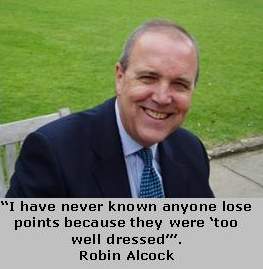 Managing impressions is critical to our chances of succeeding at interview, says leading careers coach Robin Alcock.
It goes without saying that how well you can convey your expertise to the interviewer and how you can show its relevance to him or her, will play a major part in getting hired or not.
But, in this difficult economic climate where the job markets are not working in favour of candidates, it's important to focus also on what some people call "Impression Management". This article looks at what you can do as a job candidate to improve your chances at interview.
Creating Belief and Trust
What people think you are will influence their decisions about you and how much of what you say they will respect and trust. There is a well-known psychology experiment which shows this. As with all such experiments, a group of volunteers is assembled, paying attention to keeping it as mixed as possible as to gender, age group, economic status and so on. Volunteers are usually paid a modest amount for their trouble. In this experiment they are told "We are doing some research into memory, and soon we will ask you to listen to a 20 minute lecture and will give you some questions to answer afterwards."
The group is taken to the lecture room and they are introduced to the guest speaker, a "professor of criminology at (Whatever) university, who will talk to us about crime and its causes".
What people think you are will influence their decisions about you and how much of what you say they will respect and trust.
They hear the lecture and are given the question sheet. It contains lots of questions asking what facts they remember. Sprinkled among these, are questions about how much they believed the points the speaker was making.
The memory questions and answers are irrelevant. Only belief and trust are being measured, but the volunteers are unaware of that, so as not to distort the outcome.
When the volunteers have gone, the whole process is repeated with new volunteers and this time the speaker is introduced as a "reformed former criminal" talking on the same subject.
Finally the whole process is repeated with a new group of volunteers and this time the speaker is introduced as "a concerned citizen".
Influencing Perception
When the results are analysed we find the speakers who are introduced as experts are much more strongly believed than the "man or woman in the street".
The interesting part is that in all three lectures, the identical script was read out and by the same speaker. The only difference was how he was introduced.
So, how we are perceived, is often as influential as what we say. How do we influence how we are perceived?  Firstly, by what we have already written about ourselves in our CV and letters before we even get there. You may think that because you are being interviewed, your written material must have been fine or you wouldn't be there. Not necessarily true. Firstly, by what we have already written about ourselves in our CV and letters before we even get there. You may think that because you are being interviewed, your written material must have been fine or you wouldn't be there. Not necessarily true.
Most interviewers have views about which contenders are strong and which are more marginal before they interviews start. Make sure your paperwork tells the best possible story and is convincing about what you can do that is important to their situation and needs. Keep your material focussed on this, even if it means playing down, or leaving out things that are good but not relevant.
Secondly give attention to first impressions. I know, it's a bit of a cliché but there is a marked "primacy effect". We unfortunately are prone to making a very early first impression and using all the subsequent answers to confirm that impression was right!
Another experiment shows this. Student volunteers were given short descriptions of two lecturers they had not met, and asked their opinions of them. The first description was along the lines of "cold person, analytical, intelligent, practical, hard working". The other lecturer was described in exactly the same words, except the first ones were "warm person". The student volunteers assessed the second lecturer ("warm person") much more favourably than the first.
No surprise there. But when the experiment is conducted with the key words placed later in the list, the differences in assessment are much less. The students have been pre-disposed by the first impression (that is, by the first words).
So how you behave when you first meet the interviewer is very important. You need to be "dressed for success", which usually means following the dress code of the job one level above the one you are going for. I have known clients say that they can do their particular job just as well whatever they are wearing. Sometimes this is true. But what is the right impression for interview? I have never known anyone lose points because they were "too well dressed".
Establishing Rapport
Thirdly, although the interview is mainly a serious business meeting, you must work at establishing rapport with those you are talking to. We hire people we like and who we can see ourselves working comfortably with. So smile and be friendly, don't just wear your "business face". Smiling conveys confidence, friendliness, happiness, enthusiasm.
Follow the right social and non-verbal conventions. Our body language and verbal tone convey up to 90% of the message. In other words if there is any ambiguity or if the message is at all unclear, we believe the non-verbal and the tone above the meaning of the words themselves.
We hire people we like and who we can see ourselves working comfortably with. So smile and be friendly, don't just wear your "business face".
We can't change the voice equipment nature gave us, but we can practise our delivery. Try asking a friend to listen to some of your answers and give you honest feedback. Practise answering topics that are bound to come up. (Such as describing your career up to now and what you have achieved in your different roles).Get familiar with the content and then practise the delivery, much like a singer would. If your normal delivery is a bit one-tone and one-speed (like mine!) then learn and practise to make it more animated and to vary the pace.
Finally, rapport is helped by "mirroring" or matching some of the other person's behaviour. But be cautious. We do not mean slavishly copying their words or gestures. That is going to look contrived or even, ridiculous. Mirroring means taking a lead from how they are sitting, talking, moving. For example, if their speech is relaxed and fairly slow paced, keep yours the same way. If they are very concise and hurried, be brief and speak faster.
Robin Alcock, Elmstead Consulting Limited, is an experienced career coach. Robin's coaching work is mostly helping people to enhance their workplace skills and become more fulfilled and successful in their working lives. His services cover a wide range of issues, such as a need to step up successfully to changed responsibilities, to overcome obstacles to performance, or to improve relationships at work. His other main coaching work is helping individuals who are stuck in their career or who have become casualties of reorganisation or downsizing. You can find Robin's profile on www.ecademy.com and on www.linkedin.com
|








